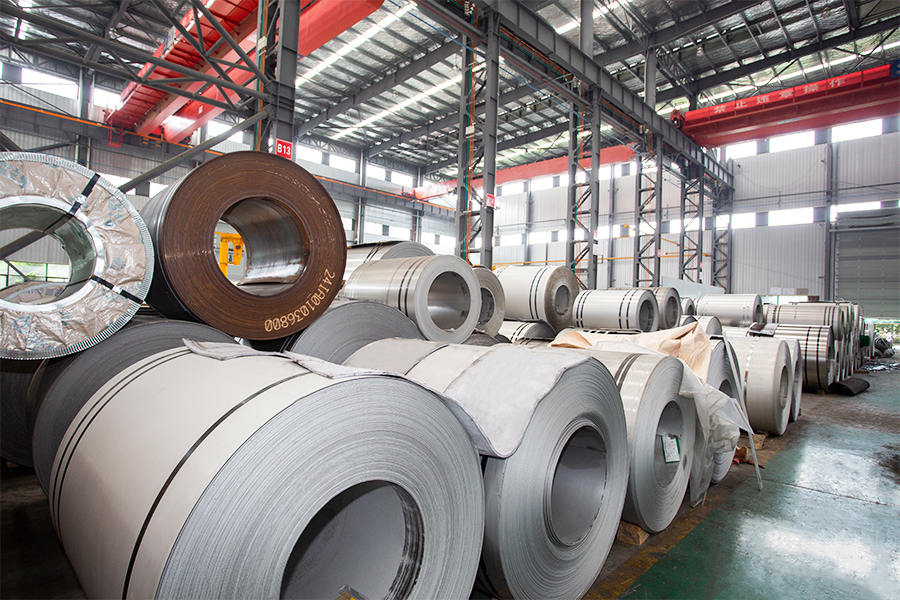Stainless steel is one of the most versatile and widely used materials in the world today, known for its strength, corrosion resistance, and durability. Among its various forms, stainless steel coils play a particularly crucial role across multiple industries. But what exactly are stainless steel coils, and why have they become indispensable in modern industrial and construction applications?
What Are Stainless Steel Coils?
Stainless steel coils are rolled sheets of stainless steel wound into a coil form for easier handling, storage, and transportation. They serve as raw material for a wide variety of products, including:
- Industrial machinery components
- Kitchen appliances
- Automotive parts
- Building facades and roofing
- Medical equipment
Stainless steel coils can be classified into cold-rolled and hot-rolled coils, each offering different surface finishes, thicknesses, and mechanical properties.
How Are Stainless Steel Coils Produced?
The production of stainless steel coils involves several complex processes to ensure quality, strength, and corrosion resistance:
- Melting and Alloying: Iron is melted with chromium, nickel, and other alloying elements to create stainless steel.
- Casting: The molten alloy is cast into slabs or billets.
- Hot Rolling: Slabs are rolled at high temperatures to achieve the desired thickness. This process produces hot-rolled coils with a rough surface.
- Cold Rolling: Hot-rolled coils may undergo cold rolling to improve surface finish, dimensional accuracy, and strength.
- Annealing: Coils are heat-treated to relieve internal stress and enhance ductility.
- Finishing and Slitting: Coils are cut or slit to specific widths and surface finishes, ready for industrial use.
This combination of processes ensures that stainless steel coils meet the mechanical and aesthetic requirements of diverse applications.
What Are the Advantages of Stainless Steel Coils?
Stainless steel coils offer several advantages that make them preferred over other materials:
- Corrosion Resistance: High chromium content protects against rust, oxidation, and chemical exposure.
- Durability: Resistant to wear, impact, and mechanical stress, providing long service life.
- Versatility: Suitable for a wide range of industrial, architectural, and household applications.
- Aesthetic Appeal: Smooth, shiny surfaces with various finishes, including mirror, brushed, and matte, enhance visual appeal.
- Ease of Fabrication: Can be cut, bent, or welded without losing structural integrity.
These properties make stainless steel coils a reliable choice for demanding environments.

What Are the Types of Stainless Steel Coils?
Stainless steel coils are typically categorized based on rolling method, surface finish, and grade:
-
Hot-Rolled Coils:
- Produced at high temperatures.
- Thicker and less precise, used in construction and heavy industrial applications.
-
Cold-Rolled Coils:
- Rolled at room temperature for smooth surface finish and tight tolerances.
- Ideal for appliances, automotive parts, and decorative applications.
-
Surface Finishes:
- Mill Finish: Natural finish from rolling process.
- Brushed Finish: Fine linear texture for aesthetic appeal.
- Mirror Finish: Polished surface for decorative or reflective purposes.
-
Grades:
- Common grades include 304, 316, and 430, each with unique corrosion resistance and mechanical properties.
Selecting the right coil type depends on application requirements, environmental exposure, and desired finish.
How Are Stainless Steel Coils Used in Industry?
Stainless steel coils serve as the foundation for a wide range of industrial products:
-
Construction and Architecture:
- Roofing sheets, cladding panels, and structural components.
- Bridges, facades, and railings benefit from corrosion resistance and aesthetic appeal.
-
Automotive and Transportation:
- Exhaust systems, chassis components, and trim parts.
- Provides lightweight yet durable solutions for vehicles.
-
Appliances and Electronics:
- Kitchen appliances such as refrigerators, ovens, and sinks.
- Electronic casings and equipment panels for durability and corrosion protection.
-
Medical and Pharmaceutical:
- Surgical instruments, hospital equipment, and cleanroom surfaces.
- Non-reactive and hygienic properties make stainless steel ideal for sterile environments.
-
Energy and Manufacturing:
- Chemical tanks, pipelines, and heat exchangers.
- Resistant to corrosion from acids, alkalis, and high temperatures.
The versatility of stainless steel coils allows industries to standardize on a material that combines strength, durability, and aesthetic flexibility.
What Are the Environmental and Sustainability Benefits?
Stainless steel is recognized for its environmental sustainability:
- Recyclable Material: Stainless steel can be fully recycled without losing quality, reducing environmental impact.
- Durability Reduces Waste: Long service life minimizes replacement frequency, lowering resource consumption.
- Eco-Friendly Production Options: Modern mills use energy-efficient processes and recycled inputs.
These factors contribute to green building certifications and sustainable manufacturing practices.
What Challenges Are Associated with Stainless Steel Coils?
Despite its advantages, using stainless steel coils comes with challenges:
- Cost: Higher raw material and production costs compared to mild steel or aluminum.
- Fabrication Complexity: Requires specialized tools for cutting, bending, and welding.
- Weight: Heavier than alternative materials, which may influence design in transportation or construction.
- Surface Maintenance: Polished surfaces may show fingerprints or scratches, requiring care.
Proper handling, fabrication, and maintenance practices are critical to maximize performance and longevity.
Why Are Stainless Steel Coils Important for Modern Applications?
With industries demanding materials that combine strength, corrosion resistance, and visual appeal, stainless steel coils have become indispensable. Their ability to be fabricated into precise, durable components ensures reliability in construction, automotive, medical, and industrial sectors.
By minimizing maintenance costs, extending service life, and supporting sustainable practices, stainless steel coils contribute directly to efficiency and long-term value for manufacturers and end-users alike.
Conclusion: Are Stainless Steel Coils the Backbone of Modern Industry?
The answer is yes. Stainless steel coils provide a versatile, durable, and corrosion-resistant material that supports a wide array of industrial, commercial, and architectural applications. From the strength needed in construction to the precision required in medical equipment, stainless steel coils meet the demands of modern society.
Ultimately, stainless steel coils answer a critical question: How can industries achieve a combination of durability, performance, and aesthetic appeal in one material? By providing a solution that balances these qualities, stainless steel coils remain essential for contemporary industrial and construction applications.


 English
English русский
русский عربى
عربى 中文简体
中文简体
